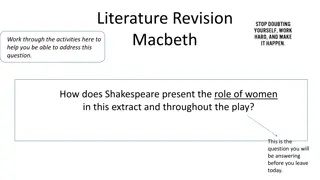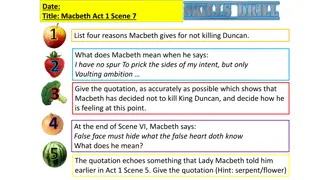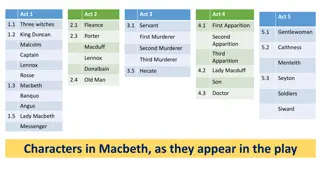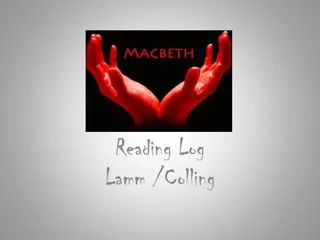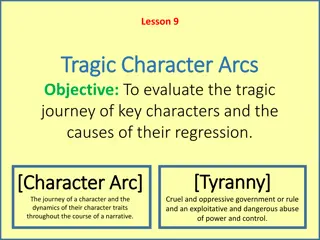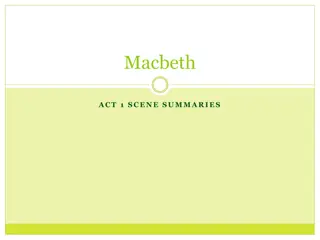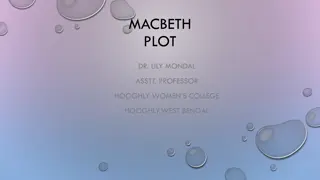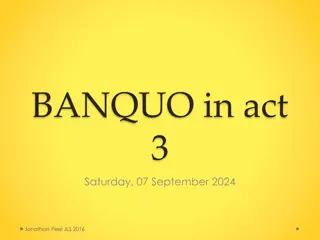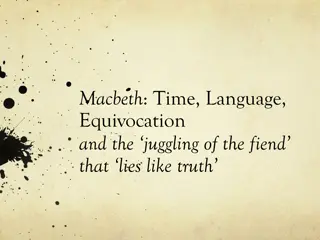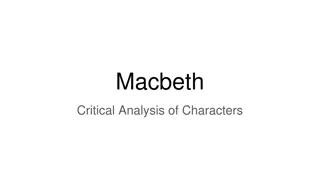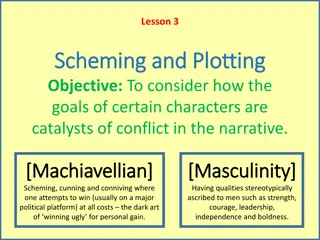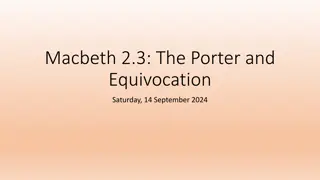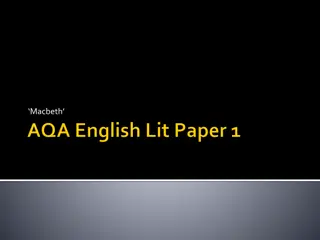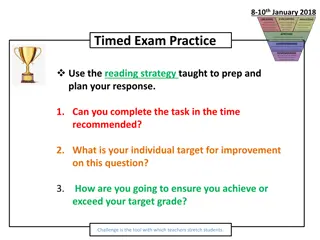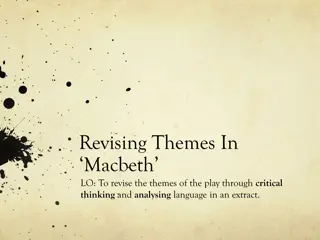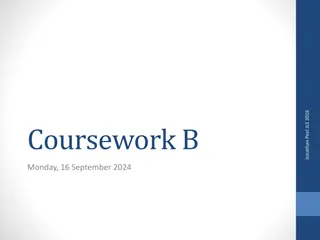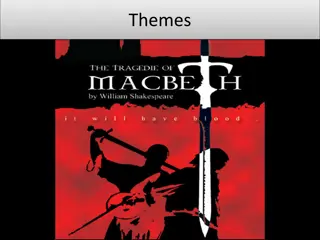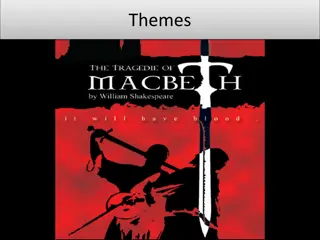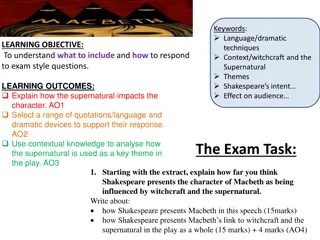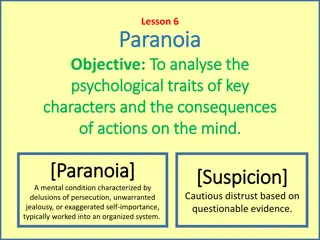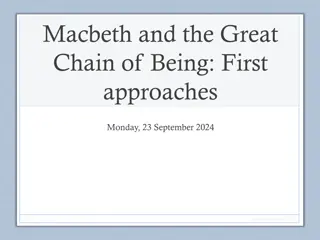Exploring Key Characters and Themes in Shakespeare's Macbeth
Shakespeare's Macbeth delves into the intricate portrayal of characters like Macbeth, Lady Macbeth, Banquo, Macduff, King Duncan, and others, set against a backdrop of ambition, power, and betrayal. Through rich language, structure, and form, Shakespeare weaves a narrative that explores themes of ambition, morality, and the consequences of unchecked desires. Delve into the complexities of these characters and themes as you unravel the unfolding drama in Macbeth.
Download Presentation

Please find below an Image/Link to download the presentation.
The content on the website is provided AS IS for your information and personal use only. It may not be sold, licensed, or shared on other websites without obtaining consent from the author. Download presentation by click this link. If you encounter any issues during the download, it is possible that the publisher has removed the file from their server.
E N D
Presentation Transcript
AQA English Literature Paper 1: Macbeth Revision Key Characters: Macbeth Lady Macbeth Banquo Macduff King Duncan Malcolm and Donaldbain The Witches GCSE English Literature: Paper 1 A: Macbeth Possible question: Starting with this extract, explain how far you think Shakespeare presents _________ as _________. (34 marks)
Introduction: Shakespeare presents __________ as a _________ throughout the whole of Macbeth. In the extract... (Include question in introduction, 3 sentences total). Conclusion: In conclusion, Shakespeare presents ________ as a ________ through his use of language, structure and form. (1 or 2 sentences total) Making inferences Suggests Demonstrate Shows Reveals Displays Infers Implies Advocates The AUDIENCE might FEEL: Admiration Alarm Apprehension Astonishment Disapproval Disturbed Enjoyment Fear Fury horror optimistic pessimistic relief revulsion satisfied thrilled uncomfortable wary because
Context: Macbeth was written by William Shakespeare in 1605. Macbeth is a tragedy. It is loosely based on real events Macbeth was a real Scottish king who ruled in the 11th century. James I was in power at the time Shakespeare wrote the play. He was also the patron of Shakespeare s acting company (The King s Men). James I was related to Banquo and Fleance. This is why they are very moral characters in the play. Elizabethans believed that even honourable men could be corrupted by ambition and the want for power. Ambition was not a good characteristic to have. Elizabethans also believed in the Divine Right of Kings which meant that kings were chosen by God. James I wrote Daemonologie about witchcraft and Basilikon Doron , which looks at how to be a good king. In Macbeth, the character of Malcolm represents the template of the ideal king.
Language: Shakespeare generally uses blank verse for most characters (except the witches). This means that the lines don t usually rhyme (except for couplets at the end of speeches/ soliloquys). Shakespeare uses iambic pentameter. This means that there are 5 big beats/ stressed syllables in each line. This puts more emphasis on certain words. Shakespeare gets characters to describe the weather fog and filthy air using metaphor and imagery to create atmosphere. Shakespeare uses gothic language words like blood , murder and gruesome words birth strangled babe . Shakespeare uses dramatic irony, Duncan describes Macbeth s castle as pleasant when the audience know he will be murdered there. Shakespeare uses Macbeth s soliloquys to show us his thoughts and feelings, is this a dagger I see before me? The Porter speaks in prose (unrhymed sentences with no iambic pentameter). This links to how he is lower class. The witches speak in rhymed verse, usually rhyming couplets, with 7 to 8 syllables. This shows they are unnatural and different. It also makes their speech sound like a chant.
Macbeth: Macbeth begins as a strong warrior brave Macbeth, well he deserves that name . He is also described as valiant and a worthy gentleman . Duncan rewards his bravery with the title of Thane of Cawdor. Shakespeare uses strong, commanding language at the beginning to show this, stars hide your fires, let not light see my black and deep desires. He is ambitious, I have no spur to prick the sides of my intent, but only vaulting ambition. Lady Macbeth thinks he is too full o th milkof human kindness a coward. However, he has a conscienceand feels guilty, Will all great Neptune s ocean wash this blood clean from my hand? Shakespeare uses questions to show his uncertainty. His confidencereturns on the battlefield before he dies, at the end, when he will not yield to Macduff and he fights bear like . He is also a brutal murderer I am settled and bend up each corporal agent to this terrible feat. He makes a deliberate decision to kill Duncan. He becomes a tyrant . He is influenced by Lady Macbeth and the witches. His ambition is stronger than his morals. At the end of the play Malcolm calls him a hell hound and a butcher . Macbeth s ambition has ruined all of his noble characteristics.
Lady Macbeth: Lady Macbeth is a cruelcharacter, And fill me from the crown to the toe topfull of direst cruelty. The crown also shows that she is ambitious. She is violent, dash the brains out . She is also cunning and manipulative, look like th innocent flower but be the serpent under t . Shakespeare uses verse to show her confidence and strength. She appeals to the spirit world to unsex her, as her ambitions can only be achieved through Macbeth in a male dominated society, Come to my women s breasts and take my milk for gall (gall = poison). She is afraidof some things, Had he not resembled my father as he slept, I had done t. She comes up with the planto drug Duncan s servants, leave all the rest to me. She pretendsto faint when Duncan s murder is discovered, help me hence, ho! Lady Macbeth is slowly driven mad by guilt, her punishment for her crimes, Out, damned spot, out I say. Shakespeare uses repetitions to show she has lost her confidence and self control, Come, come, come, come, give me your hand. Sleepwalking was seen as unnatural and caused by guilt by Elizabethan audiences. This also links to when Macbeth says Macbeth hath murdered sleep.
Duncan: Shakespeare presents Duncan as an almost modelking, full of growing . Shakespeare uses plant imagery to show Duncan wants to nurture those that are loyal to him. Macduff states he is a most sainted king reminding the audience of the divine right of kings, that they were chosen by God. Duncan is kind, hold thee to my heart. He trustedthe first Thane of Cawdor, a gentleman on whom I built an absolute trust. This suggests he is too trusting, there s no art to find the mind s construction in the face. He hands out honours to Macbeth, and with his former title greet Macbeth and to Malcolm, the prince of Cumberland. Macbeth says that his virtues will plead like angels. Duncan is not a soldier and does not have manly qualities, he has gentle senses , which makes the Elizabethan audience question the qualities of a good leader.
Malcolm and Donaldbain: Malcolm and Donaldbain are aware of the danger from people closest to them, unlike Duncan, There s daggers in men s smiles . They flee Scotland after Duncan s murder, Malcolm to England and Donaldbain to Ireland. Malcolm pretends to be a tyrant when Macduff comes to visit him to test his loyalty, But there s no bottom, none, in my voluptuousness. Malcolm is wise, wisdom plucks me from over credulous haste and honest, delight no less in truth than in life. When Macbeth is made king, Malcolm adn Donaldbain are annoyed he is making grand speeches, why do we hold our tongues? Malcolm eventually returns to Scotland with an army, disguising them with branches from Birnum Wood so that they can sneak up on Macbeth s castle, Let every soldier hew him down a bough and bear t before him. This proves he is a strong leader.
Banquo: Banquo is also a thane and a soldierlike Macbeth. He s also there when the witches make their predictions, You are lesser than Macbeth but also greater. Banquo is moral, he has a wisdom that doth guide his valour. Banquo is ambitious, but doesn t act on the witches predictions, I dreamt last night of the three weird sisters. He thinks they are instruments of darkness he is more cautious than Macbeth. Banquo sconscience is more important than power and glory, he keeps his allegience clear. He remains honourable. Banquo suspects Macbeth murdered Duncan, I fear thou play dst most foully . Macbeth could be jealous of Banquo as he has sons and therefore a father of many kings. Macbeth has a fruitless crown meaning that once he dies, he has no heir. Macbeth and Banquo are opposites in many ways. As James I was related to Banquo, it was important to present him as honest. It is good to make comparisons between them. When Macbeth sees Banquo s ghost (a sign of his guilt no one else sees Banquo sghost), it will have blood they say, blood will have blood. Shakespeare uses repetitionto show Macbeth s fear.
Macduff: Macduff is noble, this noble passion, child of integrity. He is horrifiedby Duncan s murder. Macduff is a soldier, I have no words, my voice is in my sword. He puts O Scotland, Scotland! first, before his wife and child, All my pretty ones? Did you say all? They are murdered by Macbeth. Macduff is suspiciousof Macbeth, new widows howl, new orphans cry. This is ironic as his wife and children are murdered. Macduff is loyal, he goes to Malcolm to convince him to fight Macbeth, Bleed, bleed poor country. He is brave, he fights and kills Macbeth, Macduff was from his mother s womb untimely ripped. Macduff is also an opposite of Macbeth. He is a brave soldier who fights for what is right for his country Macduff is the heroic antagonist.
The Witches: They are also known as the Weird sisters. Weird comes from the Old English wyrd which meant fate they are instruments of fate. They are supernatural, fair is foul and foul is fair they can change the appearance of reality. They would be seen as unnatural and evil. James I wrote Daemonologie about witches and how terrible they were. They can see the future, hail king that shalt be and gain nothing from telling Macbeth but they seem to enjoycreating trouble, this supernatural soliciting cannot be ill, cannot be good. Shakespeare uses short lines and rhyme to create spell like language, eye of newt and toe of frog, wool of bat and tongue of dog. The witches are usually accompanied by thunder and lightning making the atmosphere more frightening. The witches never tell Macbeth to murder anyone. It is a self fulfilling prophecy Macbeth makes it come true. The audience wouldn t necessarily be afraid of the witches it would be entertaining having them on the stage especially as they start off the play, getting the audience straight into the action.
Practice Questions to help you revise: Malcolm calls Macbeth a butcher . Do you agree or disagree with this statement? Explore how Shakespeare presents Lady Macbeth in the play as a whole. Compare how Macbeth and Banquo are presented. Who is to blame for Duncan s death? How are women presented in Macbeth?
Macbeth Claustrophobic -Shut off. Can make people feel enclosed or imprisoned. Claustrophobia, Claustrophobically Obscure -Dark & gloomy. Not everything can be seen. Obscurity, Obscurely Scheming -Obsesses over evil plans that cause harm to Deceptive -Fools others. Tells lies or pretends to be good on the outside. Deceit, Deceptively Regicide -The killing of a king. Scheme others. Scheme Macabre -Associated (Connected) with death or the dead (e.g. skeletons / graves) The Macabre Compunctio Tragedy -A play that ends in n death -A feeling of guilt that follows a sin. Compunctious, compunctiously Horrific -Actual physical threat to your body. Evidence of physical harm (e.g. corpses). Horror, Horrifically Terrifying -A suggested threat to your imagination or soul. Makes you feel uncomfortable or panicked. Terror, Terrifyingly Dichotomy -A division or contrast between two things that have polar or opposite qualities (e.g. good and bad, fair and Hamartia -A tragic flaw that leads to the death of the protagonist foul). Vengeful Ambitious -Seeking power or fame over everything else. Ambition, ambitiously Predatory -Seeks out and preys on innocents by killing them, feeding on them or imprisoning them. Predator, Predatorily Abhorrent -Wanting to take revenge for a wrong that took place in the causing repugnance; detestable; loathsome: abhorrently past. Vengeance, Vengefully
Practice Exam Question [Enter MACDUFF] MACDUFF Turn, hell-hound, turn! MACBETH Of all men else I have avoided thee: But get thee back; my soul is too much charged With blood of thine already. MACDUFFI have no words: My voice is in my sword: thou bloodier villain Than terms can give thee out! [They fight] MACBETH Thou losest labour: As easy mayst thou the intrenchant air With thy keen sword impress as make me bleed: Let fall thy blade on vulnerable crests; I bear a charmed life, which must not yield, To one of woman born. MACDUFF Despair thy charm; And let the angel whom thou still hast served Tell thee, Macduff was from his mother's womb Untimely ripp'd. MACBETH Accursed be that tongue that tells me so, For it hath cow'd my better part of man! And be these juggling fiends no more believed, That palter with us in a double sense; That keep the word of promise to our ear, And break it to our hope. I'll not fight with thee. MACDUFF Then yield thee, coward, And live to be the show and gaze o' the time: We'll have thee, as our rarer monsters are, Painted on a pole, and underwrit, 'Here may you see the tyrant.' Read the following extract from Act 5, scene 8. Here Macduff finally meets Macbeth. How does Shakespeare present Macbeth in this extract and elsewhere in the play? (34 marks)



